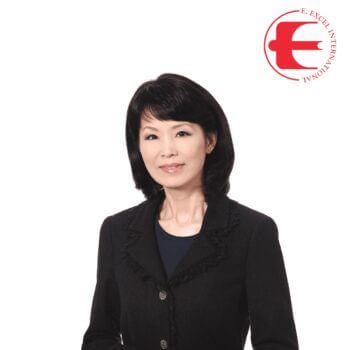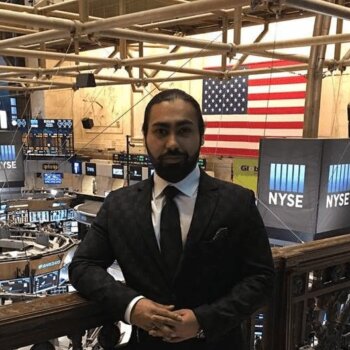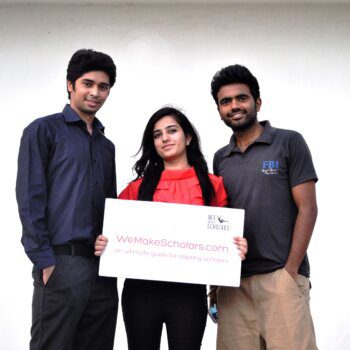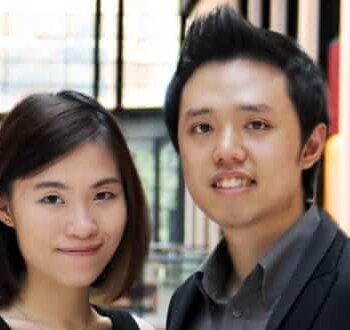Rabea Bader is the Co-Founder and CEO at IZMUS. Based in Singapore, IZMUS is responsible for the development of relevant entry points for Israeli startups, including establishing entry standards and guidelines as well as connecting key relevant industry experts. Prior to IZMUS, Rabea was the Co-founder and CEO of C.R.E Online, an outsourcing and solution specialist service provider for local and international brokerage firms and he worked as software developer for the UBS Bank and managed business development projects at D.M.D. Online. Rabbi decided to take the plunge with IZMUS when he saw a real opportunity for Singapore and he speaks to The Asian Entrepreneur today about his work.
In your own words what is IZMUS?
IZMUS is a bridge between Singaporean and Israeli start-up ecosystems, which brings the best technology to enable Singapore’s vision of becoming a Smart Nation.
IZMUS selects well funded and mature-enough startups from Israel through a thorough due diligence process and connects them to potential Singaporean partners (government agencies, business partners, investors). IZMUS enables Israeli entrepreneurs to enter the Asian market, effectively implement their technology, get further funding for their startup and accelerate growth. For investors, IZMUS is a platform to find investment opportunities in the niche high tech Israeli startups.
How did you come up with the idea of IZMUS?
The idea of IZMUS came up when I met Joy Phua, co-founder and co-CEO at IZMUS who is a Singaporean, at Tel Aviv University where I was studying Computer Science and Economics. We discussed the potential of introducing the Israeli technology in the strong financial context of Singapore – in view of its drive to become the hub of technology in SEA. As such, we founded IZMUS last year.
Could you walk us through the process of starting up IZMUS?
The initial idea was to bring Singaporean investors to Israel to meet and connect with startups there. However, after my first trip to Singapore we realized that funding was not a problem for Israeli startups. The real challenge for startups, which wanted to expand into Asian markets were cultural different in terms of language, values and approach to business.
Since Singapore is a gateway and launch pad to the rest of Asia, we decided to bring Israeli startups here and give them investment opportunities and business development in the region.
Our first meeting was with Dr Alex Lin, Head of Infocomm Investments (IIPL), the investment subsidiary of the Infocomm Development Authority. He saw the potential and helped us in establishing IZMUS. Together, we formed our business plan and started connecting Israeli startups with investors and government agencies in Singapore. As a result, we discussed collaboration with Infocomm Investments, and signed a Memorandum of Intent, which was a big step forward for us.
Did you encounter any particular difficulties during startup?
At IZMUS, we have faced several challenges in getting the best startups on board, building a strong network in both countries and connecting with investors and government.
The first challenge was that Israeli startups mostly thought of Asia as only China. Some of them didn’t know much about Singapore, for example that English is one of its official languages. Some of our clients even thought Singapore was a part of Malaysia.
Convincing Singaporean investors to switch from investing in real estate to investing in startups was also not an easy task. Luckily we found investors who believed in us and helped us reach the next level.
With the team, we overcome the challenges day by day as we are very optimistic that this business model is promising to cater to the needs of our networks and we take one step at a time.
How have you been developing IZMUS since startup?
We have been developing IZMUS a lot since we started although we have changed our focus and business model more than once.
Now we are moving in the direction of optimising and automising of all processes, and we are developing a software so that our entire network in both countries can work efficiently. We aim to provide a set of comprehensive data that will map profiles of all promising Israeli startups for investors and corporations to review and request for deeper analysis for any startup of interest. Our focus now is on Singapore but we aim to expand into Southeast Asia.
What kind of feedback did you get for IZMUS so far?
We are glad to hear that we are in the right place at the right time with a right mission and we are happy that we received many positive feedback. We have been receiving many requests from startups as well as collaboration offers from both Israeli and Singaporean corporations, investors and government agencies.
Do you face a lot of competition in this industry?
This market is still hardly tapped, but I am aware that there is always competition. Nonetheless, we believe that having competition is healthy and it encourage us to strive to be better and learn from others as much as possible.
IZMUS is one step ahead of the competitors, we provide deep analysis done by professionals for each startup we plan to bring here. We focus on quality, not on quantity and handpick the best startups from Israel after a long selection and tough screening process.
The startups are handpicked by IZMUS’ Tel Aviv team, led by Joy; then independently assessed by the tech advisory board. These advisors check all aspects of the startup – the team, technology, financial history, viability in Asia and more. Their information and IZMUS’ assessments are simultaneously available to interested VCs and investors that have subscribed to IZMUS’ web-based application. Once they secure 2-3 serious and strategic investors/partners for the startup, the relevant company representative come to Singapore for face-to-face meetings.
What can you tell us about the industry?
With the population of only 8.5 million people, Israel has more than 4800 startups. Since the domestic market is very small they typically focus on globalization and aim to expand into foreign markets, traditionally the US and Europe. However these startup scenes have started to become over-saturated and this is where IZMUS comes into the picture and provide another option.
I see that now Israeli startups are beginning to realize the untapped potential that lies in Asia, and Singaporean investors are shifting towards investing in Israeli startups because of their ability to innovate.
What is the future of the industry?
The future of the industry is to connect high potential businesses to suitable investors and partners and take it globally.
We are planning to advocate Startup Nation by establishing a strong Israeli tech presence in Asia via Singapore and realize Singapore’s Smart Nation Initiative.
In this industry it is very important to be at the forefront of all current technology trends, to have a foresight for opportunities and react quickly. It’s also crucial to maintain the company’s reputation and image. Both investors and startups trust you to find the best match for them and their expectations are always very high.
Were there anything that disappointed you initially?
When I dropped out of school and left my high-paying job to follow my passion, there were many skeptical people that tried to discourage me. But because I found something I really believe in and worked towards that direction, the confidence and strive for success stimulated me to think of new ideas and implement them. I just forget about what other people think.
What do you think about being an entrepreneur in Asia?
Being an entrepreneur in Asia is different and it may not seem like a virtue but I can see that this is changing. I feel like Asia has no place for second chances for entrepreneurs. It has its pros and cons. On the one hand it puts you under big pressure, but on the other hand you will work even harder to insure the high quality of what you deliver.
What is your opinion on Asian entrepreneurship vs Western entrepreneurship?
Asian entrepreneurship practices today are still very much a reflection of strong family values deeply rooted in Asian society, and the loyalty to existing social structures still remains as the rule for survival – while Western entrepreneurship seems to be more pragmatic and individualistic.
I think that Asian market is still untapped with a lot of opportunities and that provides a level playing field to both Asian and Western entrepreneurs.
What is your definition of success?
Success as I define it is to make a positive impact and a positive change.
Not only that, it’s also managing to reach your goals and not let the difficulties you face to prevent that.
Why did you decide to become an entrepreneur?
I grew up in the North of Israel near the Lebanese border, where everyday was a matter of life and death. I didn’t know if the war would start the next day and felt the urge to work and succeed and make the most of my life. I believe that we are living for a purpose and I want to make a real change in the world.
Being an entrepreneur is way harder and more demanding than corporate jobs. In a startup life you always work a minimum of 12 hours a day, and you don’t have your weekends. Sometimes you find yourself surviving on canned food for a month until you close the next deal or get an investment but I believe it’s worth it.
In your opinion, what are the keys to entrepreneurial success?
Hard work, believing in an idea and in yourself, expecting the unexpected, ability to work under pressure and overcome obstacles.
You will always face drawbacks and will always think about going back to your comfort zone and earning a stable income every month. But it’s important that you believe in yourself and don’t let negatitivities obstruct you from reaching your real goal.
Any parting words of wisdom for entrepreneurs out there from your personal experience?
Find something you are really passionate about and follow it.
Connect






























